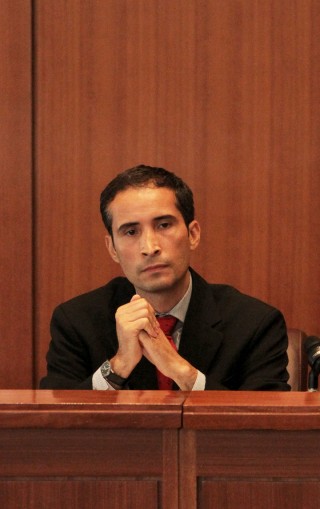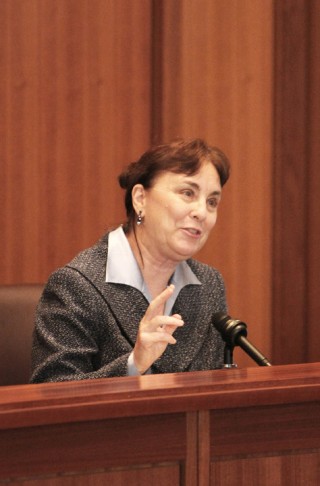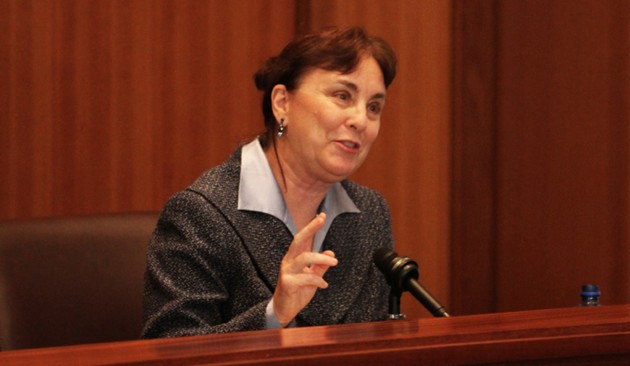
Matt Hellman | Lariat Photo Editor
By Daniel C. Houston
Staff Writer
Two experts sparred Tuesday over the proper definition of marriage before an audience of more than 100 people, debating whether homosexual couples should be granted state marriage licenses and the relationship between marriage and parenting.
The debate was hosted by the Baylor American Constitution Society and the Federalist Society, and moderated by Bradley Toben, dean of the Baylor Law School. Toben presented opening remarks that framed the evolution of federal and state marriage law in the United States.
“Throughout the history of this country,” Toben said, “marriage traditionally has been defined as a legal and spiritual union between a man and a woman; however, in recent years the definition has begun to expand as a result of change in social and family values and the activism of the gay and lesbian, bisexual and transgender communities.”
Dr. Jennifer Roback Morse, founder and president of the Ruth Institute, an organization promoting heterosexual marriage, made a distinction between what she believes are the public and private purposes of marriage.
The private purposes, she said, include factors that only affect the couple seeking marriage and by themselves do not justify the institution of same-sex marriage.
Morse said public policy should focus on the public purpose of marriage, which she said is to promote the natural relationship between biological parents and children.
“The essential public purpose of marriage is to attach mothers and fathers to their children and to one another,” Morse said. “Now, that’s an essential purpose in the following sense: if you didn’t need that purpose, I claim, you wouldn’t need the institution of marriage at all.”

Matt Hellman | Lariat Photo Editor
Manuel Quinto-Pozos, former staff attorney for the American Civil Liberties Union and the evening’s other speaker, advocated accepting homosexual marriage as a legitimate societal institution.
“The moral beliefs of the majority should not be taken and translated into laws that the majority can then use to beat up the minority,” Quinto-Pozos said. “Gay people and gay couples are just like everybody else in every way that is relevant to marriage.”
Quinto-Pozos cited U.S. Supreme Court case law that he said established the right to marry “is so fundamental to self-definition and to personal liberty” that it is protected by the “due process” clauses of the Fifth and Fourteenth Amendments to the U.S. Constitution.
“What that means,” Pozos said, “is that in order for the government to interfere with the right to marry, it has to meet what has come to be known as strict scrutiny. That is, any restriction on marriage has to be narrowly tailored to a compelling government interest, and that’s a very high bar.”
Contrary to Quinto-Pozos, Morse argued marriage is a societal institution with a single generally accepted definition that predates the definitions the state has given it.
She warned that allowing homosexuals to marry could have dangerous consequences for society generations down the line because it could undermine the needs of children to be raised by their biological parents.
“When you take away biology as the basic way that you define parenthood,” Morse said, “we’re changing the role of the state here because currently the state is simply recognizing biology as an existing natural reality; the state’s just recording it.
But now what will be happening is that the state will be defining parentage rather than just recording a natural, pre-political, pre-existing reality.”
Quinto-Pozos countered this claim by pointing out heterosexual couples who cannot have children are allowed to marry, implying the concerns of traditional-marriage advocates are influenced by a distaste for gays rather than a desire to reserve marriage for parenting.
“The justifications for keeping gay people out of marriage have been found by courts in the past to be based on outdated conceptions about gay people and our relationships,” Quinto-Pozos said. “Those conceptions are often based on morality, on religion, and courts have held that moral distaste for gay people is not enough even to survive rational-basis review.”



